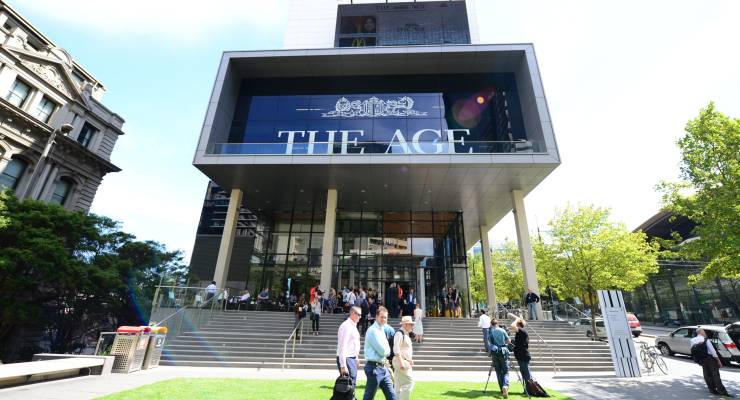
The resignation of The Age editor Alex Lavelle yesterday rips another layer off the emerging crisis within Nine’s mastheads driven by a perception that the 18-month-old new management is hurrying the metro papers to the right.
The company’s mastheads now seem positioned like The Australian about 20 years ago: lots of good journalism boxed in by an increasingly pre-set editorial line. The Australian today shows where that journey ends — with the journalism overwhelmed by culture wars and party political imperatives.
As always when editors leave from one of the country’s great papers like The Age, there’s a simple question: jumped or pushed? Either way, Lavelle’s departure and the brief 15-minute explanation given from the (currently WFH virtual) newsroom by Lavelle’s Sydney-based boss, James Chessell, has to be read in context.
That context? A letter to Nine management signed by about 70 Age journalists revealing deep internal concerns about “politicisation” of the masthead, a failure to reflect diversity and complaints about the paper becoming a Sydney subsidiary.
There are a few straws in the wind. On the culture wars front, The Age’s recent “no slavery, here” editorial kicked off the push by the right to de-legitimate the protests against systemic racism, launching supporting comments from the prime minister. The Age has since apologised and Morrison has “if anyone is offended” faux-pologised.
Over on the political front, both The Sydney Morning Herald and The Age have joined the AFR in the Liberal Party’s long campaign against industry super.
This shift challenges that “Independent. Always” slogan the merged company inherited. It was that rare bit of corporate-speak that captured both the power of the editorial mission and its importance to the business model.
Unsurprisingly, it’s what most news consumers want, most recently confirmed in the 2020 Digital News Report released on Tuesday (where it was expressed as “impartial”). Internal Nine research is understood to show the same thing.
Nine’s critics are primed to be sceptical, based on early data points: the company is chaired by former Liberal Party treasurer Peter Costello. Its CEO Hugh Marks hosted Scott Morrison at a $10,000 a head Liberal Party fundraiser on company premises last year. Chessell — the mastheads’ executive editor, who sets the editorial line — is a former staffer of another Liberal treasurer, now Sky News US contributor Joe Hockey.
Of course, there is a long history of good journalists rotating through staff jobs and political reporting, including greats like Kerry O’Brien and Alan Ramsay. The experience can provide a deep understanding of how politics works on the inside. Niki Savva at The Australian continues to demonstrate how her insider experience gives her reporting a nuance that other reporters lack.
But, inside the company, journalists feel that something is changing. The new management is much more hands on, intervening in stories and making decisions about placement that seems to promote a predetermined narrative. Tendered in evidence: the unsubstantiated June 5 front page “Activists ‘planning trouble’ at protest” (corrected with an apology online later that day).
The shock and sadness of Age journalists to Lavelle’s departure goes beyond the normal regret, describing him as a kind, gentle editor who acted with integrity and had a strong moral compass when it came to news decisions.
“I’m very sad tonight. The Age editor Alex Lavelle to exit,” state political editor Noel Towell said on Twitter.
“Thoroughly decent man. Worked tirelessly for the masthead. Very sad to see him go,” said tablet editor and former editor of The Sunday Age Duska Sulicich.
“A decent, kind and collaborative editor. Will be missed,” environment reporter and senior journalist Miki Perkins said.
“Alex Lavelle is one of the finest gentlemen I have known. A man with a moral compass, with compassion and integrity. You need to dig deeper to understand why he is gone,” former reporter Leonie Wood wrote on Twitter.
As newsroom leaders, editors have always had to play two often incompatible roles: their journalists want to be led by someone who fights on their behalf; CEOs expect a line manager who follows the company line, and gets the staff to follow on behind.
It’s now clear that the Liberal Party alignment of senior managers is taking this tension to breaking point.









Lets protest – a covid death probably isn’t much worse that what these bastards are leading us to!
What happens to a ferry load of passengers when they all crowd over to the one (starboard) side of that ferry?
In this case, it would be Kismet.
Costello’s doing what he, Howard and their rat-pack did to the country…..
And of course, the people writing straight news stories have to put up with wildly biased headlines added to their work.
Yeah, dropped my looooong-term subscription today. Lavelle’s departure the final straw.
There is now no non conservative print media in Australia. The SMH is now reduced merely a propaganda arm of the LNP. The crossword its only asset.
Spot-on. Same with the Age; if it weren’t for the cryptic crossword and sometimes the Word for the Day I’d not have subscribed, and its continuance is on a knife-edge at the moment. The rest of the paper and the website is devoted to polishing the LNP turd.
Also ZITS & Non Sequitur.